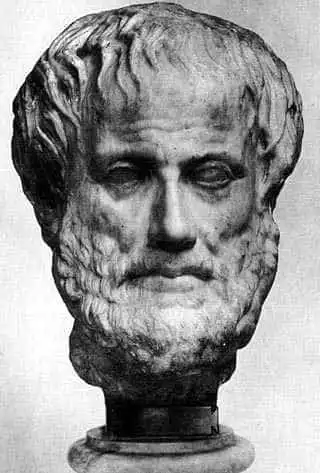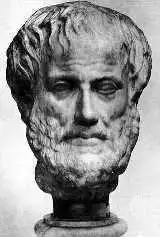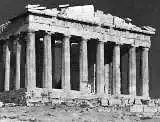Aristotle Biography 3: Stagira The life and time of the Greek PhilosopherStagira
The name Aristotle translates approximately to 'the best', suggesting that to be in bravery and the like. Aristotle was born in 384 BC, in Stagira, a small coastal town in Chalcidice, north of the Aegean sea. The town still exists, with a population of about 500. Ancient Stagira, though, was closer to the modern town Olympiada, some 25 kilometers to the south. Ruins remain and are still excavated. Ancient Stagira was founded in 655 BC by Ionian colonists from the island of Andros, and survived until the Middle Ages.
The distance from Stagira to Athens was well over 200 kilometers, also by sea, but communication was manifold and there was general knowledge of what passed in Athens — in politics as well as philosophy. Stagira belonged to Chalcidice, which was not a part of the Macedonian kingdom at the time of Aristotle's birth. It was to be annexed in 348 BC by Macedonian king Philip II. Stagira resisted for a while, but in vain. Philip was as forceful a monarch as his son, Alexander the Great, would be. The town was laid in ruins, to be rebuilt later at the order of Alexander, perhaps as a kindness to Aristotle.
 Stagira ruins.
MacedoniaAt the time of Aristotle's birth, Macedonia was under the rule of king Amyntas III (c.449-369 BC). Macedonia was an unstable kingdom, indeed hazardous for its kings. Several of them had short reigns, few reached a natural death. Amyntas III, who became king in his fifties, was one of those few. He ruled for no less than twenty years, until he died in 369 BC at the age of about 80, no foul play involved.
After his death, it was back to business as usual, with a quick succession of kings. His son Alexander II was king briefly 369-368, brutally replaced by Ptolemy, son of Amyntas II. Ptolemy was not that much more persistent, being replaced by Perdiccas III, again a son of Amyntas III, in 365. He managed a longer rule, dying in 359, when his young son was installed with Perdiccas' brother Philip as a sort of guardian. But Philip swiftly brushed the boy aside and installed himself as king, the same year. That was the third and last of sons of Amyntas III to become king.  Philip II.
The capital of Macedonia between about 400 and 167 BC was Pella, some 40 kilometers northwest of Thessalonica. Between Macedonians and Athenians, there was sometimes peace and sometimes battle, but always tension. The latter regarded the former as little but barbarians, but both Philip and his son Alexander sought a peaceful coexistence of mutual respect — sort of. On the other hand, the Macedonians had even started their own Olympiad, since they were not allowed to participate in the original one.
Aristotle, his life containing parts of both Macedonia and Athens, was to experience the delicacy of this balance more than once. 384 BCIn 384 BC, when Aristotle was born, Socrates had been dead for 15 years. Plato was 43, just three years past the traditional age of flourishing, and his Academy had been in function for about four years. Sophocles had been dead for two decades. So had Euripides, who spent his last years at the Macedonian court in Pella. Aristophanes died just the year before. In both drama and philosophy, Greece was well into its splendor.
As for drama, the peak was passed. The great playwrights of Greece — Aeschylus, Sophocles, Euripides and Aristophanes — all belonged to the 5th century BC, while the 4th century mainly produced comedy, none of as lasting value. Of the 45 plays extant today, only one is from the 4th century — Menander's The Bad-Tempered Man. Of Aeschylus there are 7, Sophocles 7, Euripides 19, Aristophanes 11. FatherAristotle's father was Nicomachus and his mother Phaestis. We know little about brothers or sisters, except that Aristotle must have had at least one, since he had a nephew, Callisthenes, whom he recommended to the service of Alexander the Great — something he would have reason to regret.Diogenes refers to Hermippus in having Nicomachus' father Machaon, and his grandfather the legendary Asclepius, whereas Dionysius of Halicarnassus gives the name Esculapius for the grandfather. In his letter to Ammaeus, Dionysius states that Aristotle's father traced his lineage to Machaon, which implies more generations than just one. Nicomachus was a prominent physician, member of the guild of the Asclepiade, with prominent physicians allegedly ascended from Asclepius, father of Troy battlefield medics Machaon and Podaleirios. Hippocrates (c.470-c.410 BC), the father of medicine, was also an Asclepiade physician. This tradition of medics was about 200 years old, at the time of Aristotle's birth. According to the sources, Nicomachus had cared for the health of king Amyntas III of Macedonia, and may also have been a friend of his. If Aristotle's father was indeed a friend of Amyntas III, that would be a fortunate thing during his rule, but could very well be the opposite under another king. The one to take over after Amyntas was his son, Alexander II, who would have been likely to respect the friends of his father, but after just a year he was killed by Ptolemy Alorites, the new husband of Eurydice, widow of Amyntas II. He ruled 368-365 — and that period the friends of Amyntas III might have been out in the cold. In 365 the rule returned to sons and grandsons of Amyntas III, all the way to the death of Alexander in 323. The difficult time for friends of Amyntas III, 368-365 BC, is particularly interesting, since it was in this short period that Aristotle left Macedonia to study in Athens, in 367 or 366. So, he might have had other motifs for this, than an intellectual thirst. At least, Aristotle took off in a time when he was the least likely to have good opportunities in the court of Pella. Considering the distance between Stagira and the capital Pella (more than 100 kilometers), Nicomachus was probably no longer Amyntas' physician at the time of Aristotle's birth. If he was, either he lived apart from his family, or they moved to Pella after Aristotle's birth. Both alternatives seem odd. As a physician to the king, he would be in Pella and remain there. Kings are particular about their physicians, and not delighted to see them travel about, although that was the custom among Asclepian medics. It is most likely that Nicomachus either had been replaced as Amyntas' doctor, or that he replaced someone else after the birth of Aristotle, bringing his family with him to Pella. Tradition has it that the doctor was at friendly terms with the king, which hints the high age of Nicomachus, considering that Amyntas was about 65 years old at the time of Aristotle's birth, and a friend of the king was not likely to be too much his junior. A friendship also suggests a longer connection between them than the few years left of Nicomachus' life after his son's birth. Kings neither hire physicians nor befriend them in a whim. And how much of a friend could Nicomachus have been to the king, if he lived that far from Pella until his appointment? If indeed he moved there to work that closely to the king, while Aristotle was an infant, would Aristotle leave such a distinguished environment already in his teens, not to return to it? With the words of Aristotle: possible, but not plausible. It is far easier to imagine that Nicomachus had done a long service to the king, and retired from it to Stagira, to which town his wife had strong links. Another indication of this, is his death before Aristotle reached adult age. No information is given about his age, but a physician in good circumstances was likely to have a long life, so he may already have reached an admirable age when Aristotle was born. We do not know when Aristotle's mother died, but we know that he was given a guardian. Aristotle may have lost both his parents at an early age, and found himself with little of a future in Stagira, since his father had not had the time to teach him properly the ancestral skills of medicine.
The information about Nicomachus as a physician for the king, comes from Diogenes Laertius, who got it from Hermippus, saying about Nicomachus that "he resided with Amyntas, the king of Macedon, in the capacity of physician and friend." Dionysius of Halicarnassus, on the other hand, mentions nothing of it in his short biography of Aristotle in the letter to Ammaeus. Unfortunately, a mere exclusion of a circumstance is not equal to a denial of it. Regarding Diogenes' source Hermippus, though, he seems to be a modestly trustworthy reference, considering whom he made Nicomachus' grandfather, mentioned above. Anyway, it seems to be generally accepted among scholars, that Aristotle's father was indeed the king's medic. He was no doubt worthy of such a position, in the measures of the time. MotherAristotle's mother Phaestis was a descendant of one of the founders of Stagira, bringing a colony from Chalcis, on the isle of Euboea. Her family owned property in Chalcis, where Aristotle would go at the end of his life.Nothing more is known about Phaestis. It is likely that she did not outlive her husband Nicomachus by many years. She may even have passed away before he did. Phaestis cannot have been very old when giving birth to Aristotle. Still, her husband could have been, since such an age difference between man and wife was not rare at all. Aristotle would himself not marry until his late 30s, to a girl probably 20 years younger — which was also what he recommended, perchance from the model of his parents?
 Stagira ruin.
ChildhoodSo, Aristotle was born into a family of significance and means. The tradition of the Asclepian physicians was for a son to follow in his father's footsteps. The profession was practically hereditary, and the knowledge was kept within its circle, passed on from father to son. Had Aristotle grown up under his father's wings, he could hardly have done anything else.But Nicomachus died when Aristotle was still a child, probably when he was about 10 years old. Aristotle must at least have been young enough for his education as a physician not to have progressed significantly, or that career would still have been unavoidable. Dionysius of Halicarnassus implies that Aristotle's father died right before the son left for Athens: "In the archonship of Polyzelus, after the death of his father, he came to Athens, being then eighteen years of age." It is not clear, and furthermore not likely, that events should have that immediate order, as if Aristotle left his hometown because of his father's death. At that age, Aristotle would have been well on the same career as that of his father, and there would not have been much use with a guardian for him. The care of Aristotle's upbringing was taken over by a guardian named Proxenus of Atarneus, who was either his uncle or a friend of the family. He cannot have been a physician, since Aristotle was not directed toward that profession. No doubt, Aristotle was given a profound education in the Greek tradition, language and literature from Homer and Hesiod to the contemporary writers of dignity. Aristotle would later prove to be excellent at writing, a skill which flourishes by practice but peaks only when accompanied by significant talent — sure to reveal itself early in life.
Proxenus must have found his protégé an exceptionally willing and able student. The Greeks praised learning, and people of means were welcome to devote themselves to philosophy in its broad sense of the time, without the prospect of a profession nearby. When Aristotle showed an appetite for intellectual endeavors, he was surely both supported and encouraged. Then, with the medical profession already excluded, and with Pella less promising with a ruler hostile to the friends of Amyntas III, Athens was an obvious temptation. Aristotle would do well to go there, as soon as he had reached an age where he could be expected to take care of himself. At the age of 17 or 18, somewhere in 367-366 BC, he did. NEXT
AristotleIntroductionAristotle's LifeTimelineAristotle's PoeticsAristotle's Cosmology
The Greek PhilosophersAbout CookiesMy Other WebsitesCREATION MYTHSMyths in general and myths of creation in particular.
TAOISMThe wisdom of Taoism and the Tao Te Ching, its ancient source.
LIFE ENERGYAn encyclopedia of life energy concepts around the world.
QI ENERGY EXERCISESQi (also spelled chi or ki) explained, with exercises to increase it.
I CHINGThe ancient Chinese system of divination and free online reading.
TAROTTarot card meanings in divination and a free online spread.
ASTROLOGYThe complete horoscope chart and how to read it.
MY AMAZON PAGE
MY YOUTUBE AIKIDO
MY YOUTUBE ART
MY FACEBOOK
MY INSTAGRAM
MY TWITTER
STENUDD PÅ SVENSKA
|
 Cosmos of the Ancients
Cosmos of the Ancients